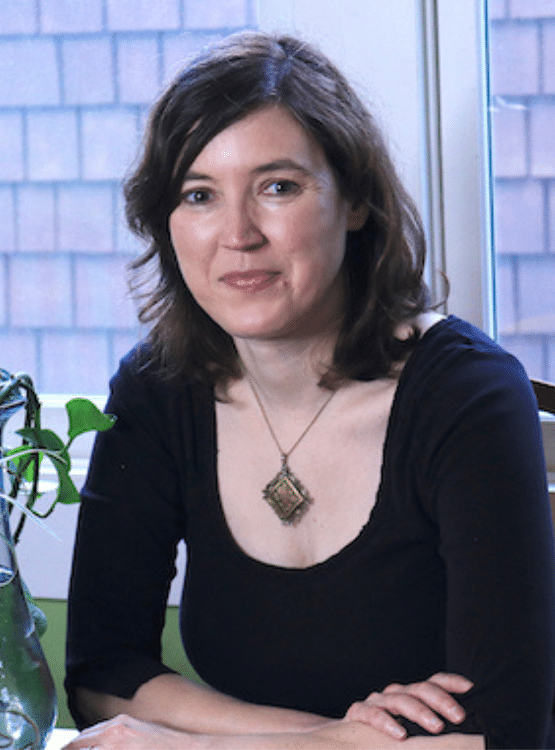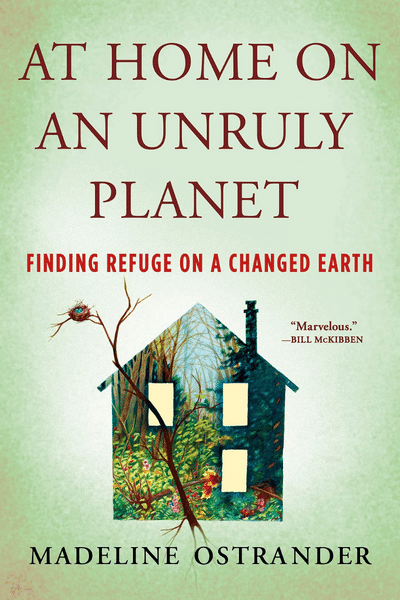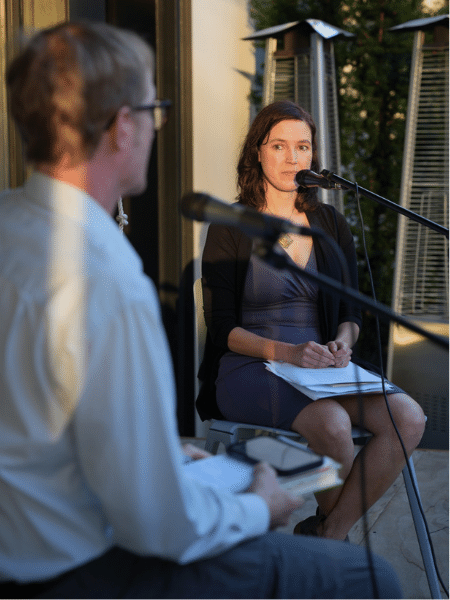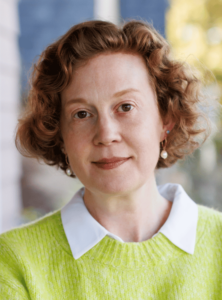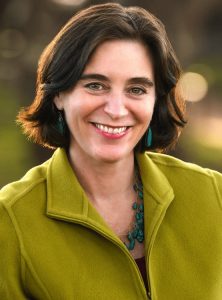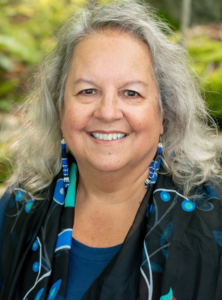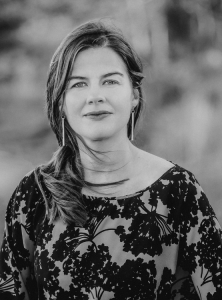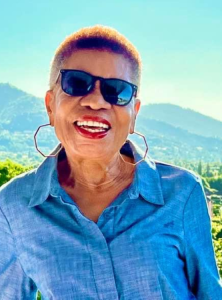 “The focus of our annual Bainbridge Island Environmental Conference in 2023 was climate change. Madeline Ostrander’s book, At Home on an Unruly Planet, provided the common touchstone for consideration prior to the conference. Her keynote presentation brought to life the people and situations our community had read about and made them even more relatable for conference participants. In the follow-up breakout sessions, community members were inspired to approach climate change issues and create solutions, harkening back to the examples Ostrander provided for us.” — Maradel Gale (Sustainable Bainbridge) and Lara Hansen (EcoAdapt) on behalf of the Bainbridge Island Environmental Conference Steering Committee
“The focus of our annual Bainbridge Island Environmental Conference in 2023 was climate change. Madeline Ostrander’s book, At Home on an Unruly Planet, provided the common touchstone for consideration prior to the conference. Her keynote presentation brought to life the people and situations our community had read about and made them even more relatable for conference participants. In the follow-up breakout sessions, community members were inspired to approach climate change issues and create solutions, harkening back to the examples Ostrander provided for us.” — Maradel Gale (Sustainable Bainbridge) and Lara Hansen (EcoAdapt) on behalf of the Bainbridge Island Environmental Conference Steering Committee
 “What does it mean to maintain a sense of place in an age of climate change? In At Home on an Unruly Planet, Madeline Ostrander explores this question with searching intelligence and uncommon empathy.” — Elizabeth Kolbert, New York Times bestselling author of The Sixth Extinction
“What does it mean to maintain a sense of place in an age of climate change? In At Home on an Unruly Planet, Madeline Ostrander explores this question with searching intelligence and uncommon empathy.” — Elizabeth Kolbert, New York Times bestselling author of The Sixth Extinction
 “Home may be the most pungent word in the language—and it’s no longer something any of us can take for granted, as a rapidly changing planet mocks our ideas of permanence and stability. As Madeline Ostrander makes clear in this marvelous book, resilience is a new watchword: we’re going to have to be light on our feet, even as we plant them in home ground!” — Bill McKibben, New York Times bestselling author of The Flag, the Cross, and the Station Wagon: A Graying American Looks Back at His Suburban Boyhood and Wonders What the Hell Happened
“Home may be the most pungent word in the language—and it’s no longer something any of us can take for granted, as a rapidly changing planet mocks our ideas of permanence and stability. As Madeline Ostrander makes clear in this marvelous book, resilience is a new watchword: we’re going to have to be light on our feet, even as we plant them in home ground!” — Bill McKibben, New York Times bestselling author of The Flag, the Cross, and the Station Wagon: A Graying American Looks Back at His Suburban Boyhood and Wonders What the Hell Happened
 “Ostrander visits with communities on the front lines of climate change and comes away with stories of hope, hardship, and resilience. Her book reminds us that home isn’t a place so much as a process: a radical act of continuous creation and renewal.” — Jessica Bruder, New York Times bestselling author of Nomadland: Surviving America in the Twenty-First Century
“Ostrander visits with communities on the front lines of climate change and comes away with stories of hope, hardship, and resilience. Her book reminds us that home isn’t a place so much as a process: a radical act of continuous creation and renewal.” — Jessica Bruder, New York Times bestselling author of Nomadland: Surviving America in the Twenty-First Century
 “With deep, compassionate reporting and elegant prose, Madeline Ostrander takes us into the lives of those rebuilding communities in the wake of climate disasters. Amid the devastation and loss, she finds creativity, vital hope, and a sense of home that outlasts any address.” — Michelle Nijhuis, author of Beloved Beasts: Fighting for Life in an Age of Extinction
“With deep, compassionate reporting and elegant prose, Madeline Ostrander takes us into the lives of those rebuilding communities in the wake of climate disasters. Amid the devastation and loss, she finds creativity, vital hope, and a sense of home that outlasts any address.” — Michelle Nijhuis, author of Beloved Beasts: Fighting for Life in an Age of Extinction
 “In this beautiful, troubling, deeply compassionate book, Madeline Ostrander explores our home planet in this moment of climate-driven fire and flood, and asks one of the most important questions of our time. How do we define a home when it is changing under our feet? What she finds makes At Home on an Unruly Planet a don’t-miss book.” — Deborah Blum, Pulitzer-prize-winning author of The Poisoner’s Handbook: Murder and the Birth of Forensic Medicine in Jazz-Age New York
“In this beautiful, troubling, deeply compassionate book, Madeline Ostrander explores our home planet in this moment of climate-driven fire and flood, and asks one of the most important questions of our time. How do we define a home when it is changing under our feet? What she finds makes At Home on an Unruly Planet a don’t-miss book.” — Deborah Blum, Pulitzer-prize-winning author of The Poisoner’s Handbook: Murder and the Birth of Forensic Medicine in Jazz-Age New York
 “The braided stories in this book bring it home to us—we are already in the climate emergency, and seldom is it made clearer than here that it is a polycrisis, hitting us on many fronts and levels in ways that won’t be going away. What’s encouraging is the strength, cleverness, and resiliency of the people who fill these pages, coping with new situations that won’t be going away. Above all, this is a hopeful book, and an encouragement to act.” — Kim Stanley Robinson, New York Times bestselling author of The Ministry for the Future
“The braided stories in this book bring it home to us—we are already in the climate emergency, and seldom is it made clearer than here that it is a polycrisis, hitting us on many fronts and levels in ways that won’t be going away. What’s encouraging is the strength, cleverness, and resiliency of the people who fill these pages, coping with new situations that won’t be going away. Above all, this is a hopeful book, and an encouragement to act.” — Kim Stanley Robinson, New York Times bestselling author of The Ministry for the Future
 “As each new climate calamity obliterates, incinerates, or engulfs entire communities, we shudder to think our own could be next. Gently but purposefully, Ostrander guides us into places that have known this nightmare, not to shock but to show that the meaning of home is so powerful that people will make surprising, imaginative, even transcendent leaps to hold on to theirs. By her book’s end, you realize that maybe you could, too.” — Alan Weisman, author of The World Without Us and Countdown
“As each new climate calamity obliterates, incinerates, or engulfs entire communities, we shudder to think our own could be next. Gently but purposefully, Ostrander guides us into places that have known this nightmare, not to shock but to show that the meaning of home is so powerful that people will make surprising, imaginative, even transcendent leaps to hold on to theirs. By her book’s end, you realize that maybe you could, too.” — Alan Weisman, author of The World Without Us and Countdown
 “A gripping and sometimes raw look at the personal costs of climate change, this book places our everyday experiences of home in the context of decades of environmental movements and eons of geologic time. Heartbreaking, but also funny and hopeful—you won’t want to put it down, and you won’t be able to forget it.” — Annalee Newitz, author of Four Lost Cities: A Secret History of the Urban Age
“A gripping and sometimes raw look at the personal costs of climate change, this book places our everyday experiences of home in the context of decades of environmental movements and eons of geologic time. Heartbreaking, but also funny and hopeful—you won’t want to put it down, and you won’t be able to forget it.” — Annalee Newitz, author of Four Lost Cities: A Secret History of the Urban Age
 “From fires to floods to sea-level rise, Ostrander exposes readers to the serious impacts of climate change through the eyes of ordinary Americans. Meet Susan, Glenn, Jenny, and Lisa—all of their stories underscore the impact of global change on our homes. This book is a must-read for assessing the future of life on Earth.” — Meg Lowman, author of The Arbornaut: A Life Discovering the Eighth Continent in the Trees Above Us
“From fires to floods to sea-level rise, Ostrander exposes readers to the serious impacts of climate change through the eyes of ordinary Americans. Meet Susan, Glenn, Jenny, and Lisa—all of their stories underscore the impact of global change on our homes. This book is a must-read for assessing the future of life on Earth.” — Meg Lowman, author of The Arbornaut: A Life Discovering the Eighth Continent in the Trees Above Us
 “A hopeful, urgent, and universal message about our collective ability to face the climate changes we can no longer ignore.” — Kirkus Reviews (starred review)
“A hopeful, urgent, and universal message about our collective ability to face the climate changes we can no longer ignore.” — Kirkus Reviews (starred review)
 “Pick up a copy of At Home on an Unruly Planet…you’ll feel that deep, meditative connection between the frightening but solvable realities of climate change and a place that you have once called home, too.”
“Pick up a copy of At Home on an Unruly Planet…you’ll feel that deep, meditative connection between the frightening but solvable realities of climate change and a place that you have once called home, too.”
—Arizona Republic
